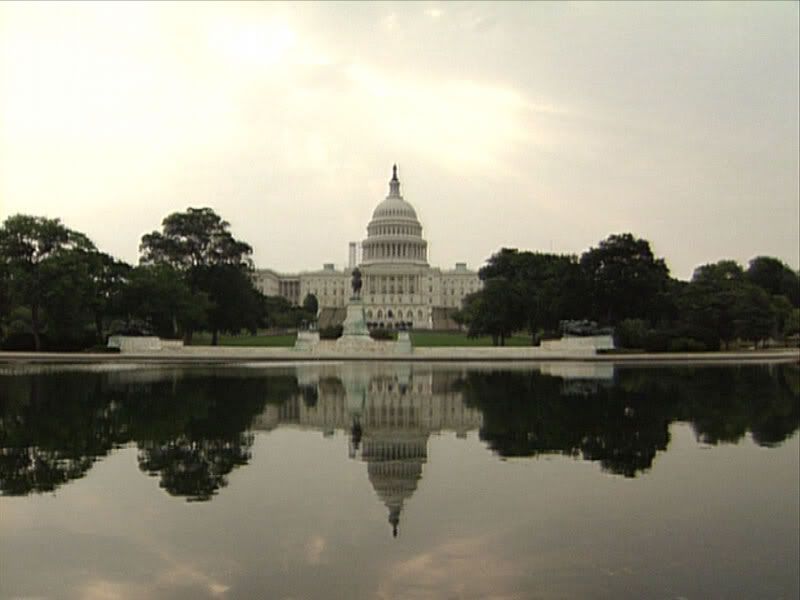The Editorials of E. Desiderius
« Home
Friday, March 31, 2006
The Case For Gender Blind College Admissions

Much has been made in recent days of the academic problems plaguing young men. The New York Times’ John Tierney and an Op-Ed called “To All the Girls I’ve Rejected,” Newsweek, The New Republic, The Washington Post and scores of other outlets have run alarming portraits of young men, not attending college, moving back in with their parents, lacking career ambitions, lacking of academic success, and so forth.
But the most alarming notion out of this media frenzy is the idea that schools have now begun admit young men who are less qualified than their female counterparts, in order to maintain a gender balance on campus. “Few of us sitting around the table were as talented and as directed at age 17 as this young woman,” wrote admissions officer Jennifer Britz in her Times piece concerning a young women who was nearly rejected from Kenyon. “Unfortunately, her test scores and grade point average placed her in the middle of our pool. We had to have a debate before we decided to swallow the middling scores and write ''admit'' next to her name. Had she been a male applicant, there would have been little, if any, hesitation to admit. The reality is that because young men are rarer, they're more valued applicants.” [1].
The big problem with all this is that there is truly no excuse for young men. Affirmative action programs, their merit and fairness aside, were designed to correct a social wrong, to compensate for a group that was previously discriminated against and placed in a lower social position. But how can one make the case that males, especially middle-class, white males, have had anything but all doors open to them?
The pantheon of history is filled with male intellectual role models, successful, powerful and rich men run the largest corporations, the great majority of the United States government is composed of white males, almost every head of state across the world is a male, and a majority of college professors are male as well. There is no glass ceiling for men, and there is no discrimination. In classrooms, males monopolize class time, and teachers call on them more. Nothing in a young, white male’s experience has ever taught him that he is incapable, inferior or incompetent. Rather, middle-class males have had every door held open for them, and practically been shoved through by over-eager dotting parents. In many cases, these are males born with a silver spoon, or at the very least a bronze one, and a ticket to career success. Any academic underachievement is simply the result of their own complacency, their own lack of ambition and their own disconnect with the system.
Women have worked too hard, have struggled for too long, and have been too undervalued in almost every aspect of American society to have American universities hold them to a higher standard when it comes to college admissions. It is the worst sort of backhanded discrimination after decades of progress. It is an unacceptable practice to weigh and value male applicants over females, simply for gender balance. A huge unequal gender ratio may make a school slightly less desirable to both women and men, however it is a small price to pay to ensure that decades of hard work by young women in achieving social and academic equity is not discarded to accommodate young men who are simply not as deserving. Dragging under-qualified and less-deserving males kicking and screaming through college does no one a favor, including them. If the school system needs to be reformed to maintain the interest and engagement of young men, then let that be the solution. However, college admissions should and must be completely gender blind, enforced and backed by federal law. Any less would be more complacency.
-E. Desiderius
-Full Disclosure: This author is male, once left school and moved in with his parents, and was admitted to a relatively elite university (however, non-American) with grades that most likely did not meet the cut, and may have benefited from the same sort of male affirmative action that he now rails against. This author pledges to make disclosures that affect objectivity or create bias.
[1] New York Times Select (Subscrip. Required) – To All the Girls I’ve Rejected
New York Times Select (Subscrip. Required) – On Campus, A Good Man is Hard To Find
Newsweek – The Trouble With Boys
The Washington Post - What’s Happening to Boys
The New Republic - Boys and Books
edesiderius@gmail.com
Thursday, March 30, 2006
Why Amartya Sen Is Wrong On The Clash of Civilizations

In a Slate piece adopted from his new book, Harvard Professor Amartya Sen claims that one of the key problems with Samuel Huntington’s “Clash of Civilization” is that it focuses solely on a religious identity and ignores the multitude of other identities that an individual has and takes up. Further, the boundaries between Huntington’s civilizations are fuzzy and fluid; and never mind the theory ignores the multitude of internal strife within civilizations. However, Sen’s presentation and treatment of Huntington is an unfortunate straw man.
Huntington does not claim that religious identity is the sole basis for distinguishing between the civilizations, though at first glance the civilizational lines he draws are indeed based along religious lines. But Huntington does not posit that it is religious identity which makes for a clash between civilization, but rather culture. Indeed, religion and religious values play an enormous role in culture, but not the only part. In short, yes, Huntington’s “Western Civilization” is drawn out of Christendom. But the West is also the result of Caesar crossing the Rubicon, Augustus, Plato and Socrates, Galileo, the Battle of Tours, the Magna Carta, Darwin, Martin Luther and the Reformation, the Renaissance, the French Revolution, and so forth. Civilizational experience, and thus values and beliefs, arises out of all strands of cultural experience, whether it be Christianity and religious experience or The Origin of Species and Candide.
Sen’s point that Westerners to tend to view Islam through a prism by classifying them as “The Islamic World” has merit. It is a simplification to ignore the other identities that each and every individual human being has. However, one could make that case that any social science or humanistic academic field ignores and reduces the wide variety of distinction and individuality that arises between unique human beings, in order to formulate a general working academic theory. Political science, to formulate a general order of things must break down all the factors at work in a state, into a workable model. Simplification is simply required to formulate any sort of general theory. And humanities, unlike pure logic, have long recognized that there is the possibility of a deviant variable: an exception that does not break the rule. Thus, we as academics and journalists are allowed to form working models and thermos of the way the world works, without disregarding our entire theory based on outliers and deviants. Essentially, sometimes it is okay to simply the world, as Huntington does.
Further, he claims that the civilizational lines are irrationally drawn, and ignore the wide variety of dissent and conflict within civilizations, and gives some examples of internal divisions: race, social class, gender, language, nationalities. However, this too is a mute point. Sen is saying that the world cannot be grouped into trans-national blocs of people that have similar cultural experiences and worldviews. However, at the same time, he is affirming that sub-national groups like racial groups or class-based groups can band together and create a movement of dissent, change or protest within a larger group. Essentially -- People with similar goals and outlooks will band together for common cause. If sub-national groups with similar interests can unite together, why is it an outrageous idea that larger groups with very similar cultural interests that transcend the nation-state will join in their own common interest? African-Americans in the United States opposed the national policies of the government and some worked to bring about social change, but during all of the major wars the United States faced: both World Wars, Vietnam, and Korea, droves of them still served their country. They put aside a dissenting identity and embraced a wider identity that still fit with their overall worldview.
Thus, of course there is dissent within what is though of as the Islamic Civilization, in Huntington’s terms. Shiites, Sunnis, Kurds, Persians, Turks, men, women, radicals, moderates, liberals, clergy, etc. However, when a larger, greater threat or conflict appears, they will unite and react as a block. Sunnis and Shiites were united in their denouncing of the Danish cartoons, as were Jordanians and Iraqis, just as Europeans stood in solidarity with their Dane counterparts in defense of free speech.
Sen’s argument essentially amounts to what is a typical undergraduate-equse statement of “The world is a complicated place.” Indeed, the world is a complex place. But in trying to formulate working models and effective theories, simplification and classification certainly have their place. Huntington’s theory is by no means perfect. But is is a way of understanding and addressing the world’s events and problems. It is a theory that has attempted, and somewhat successfully predicted, the slow, but graduation transition of the world from national and ideological identities into transnational and cultural ones. Sen’s quick dismissal of Huntington is cosmopolitanism at its worst: a surrender to the idea that the world is too complex to attempt to be understood and that it is useless to endeavor to formulate theories and predictions on a wide scope. Shame on him.
-E. Desiderius
Relevant Articles:
Slate: Amartya Sen - What Clash of Civilizations?
edesiderius@gmail.com
Wednesday, March 29, 2006
The Immigration Debate: Nativist Hysteria and Election-Year Politicking

Despite the American national debt reaching a staggering 9 trillion USD, despite an ever-failing war effort, a disastrous Medicare bill, a lack of any sort of domestic policy agenda and despite a massive proclaimed global war on terror, the issue being debated by Congress right now is: Immigration Reform.
Now, the Republicans in Congress frame immigration reform as a national security issue. It is not. If they were serious about national security, they’d have tackled securing chemical plants and railway lines, as well as countless other small security loopholes. Never mind a realistic alternative energy plan, to wean us of our need for foreign oil. Never mind serious (not halfhearted) negotiations and diplomatic action against both Iran and North Korea about their respective nuclear programs. Rather, their proposals mostly focus on securing the southern border with Mexico, and don’t address the three-times-as-large, much less patrolled Canadian border. After all, the idea to build a wall is along the Mexican border Rather, proposals like the wall, massive deportation, or even using armed predator drones to patrol the borders, are cheap scare tactics, to score points with the ever-so-slightly xenophobic right-wing (see: Minuteman Project). Meanwhile, President Bush can come out softy against hard-line immigration reform, to avoid completely driving the Hispanic vote away from the Republican Party.
Granted, better security at the borders (both of them) and documenting illegal immigrants cannot be a bad thing. But the bill produced by the House of Representatives is punitive in the worst way. Much has already been made about how it would make it a federal crime to offer an immigrant so much as a meal, as well making it a felony to be in the United States illegally. Meanwhile, the Senate bill is far more reasonable, yet still stinks of the same sort of hasty recklessness. Illegal immigration is certainly not a new issue. The Republicans have had six years to address it, and the Democrats had eight before them. Why the issue must be rammed through Congress in the next few weeks is a mystery? President Bush called for a civil immigration debate, which in general, it has been. However, the point remains that the legislation is haphazardly constructed
This author does not oppose meaningful immigration reform. But that reform should not and must not be rooted in backhanded xenophobia, nor should it come about because the Republican Party wants to bolster its chances at re-election and fire up its base. This author fully recognizes the political forces at work, as well as the political realities, but America has always been a promise land for people across the Globe. An immigrant reform bill should not punish desperate economic refugees seeking honest employment and a chance at the American dream, nor should it punish Good Samaritans who aid the most desperate among them. Meanwhile, the much more sensible Senate bill will most likely be killed, because opponents have painted the word “amnesty” into it, hoping to render it “politically toxic” as the New York Times described [1].
-E. Desiderius
Relevant Articles
[1] New York Times – Its not Amnesty
edesiderius@gmail.com
Tuesday, March 28, 2006
Vive La France?: On the Future of France

It was as telling sign when French President Jacques Chirac and his companions stormed out of an EU summit last week because a fellow Frenchman had dared to address the assembled leaders in English. But English is the language of international business, protested the Anglophile Frenchman. Not so!, bellowed Francophile Chirac. “France has great respect for its language…It has been fighting for a long time to establish the presence of the French language - whether it be at the Olympic Games, where it was contested for a while, whether it be in the European Union, or at the United Nations” [1]. Six months after Paris’ immigrant laden suburbs rose up in a shocking display of raw emotion and anger, and a mere handful of days before a huge student strike was to shut down his country, protesting an economic stimulus law, it was the mortal insult to the French language that the French President was most concerned about.
In the post-War years, while the United States was engaged in a global game of cat-and-mouse with the Soviet Union, the general French population slowly embraced socialism. They quickly tired of de Gaulle’s military and colonially focused rule, and after the 1968 student riots, France slowly built a strong welfare-state apparatus. Out of this comes their concept of entitlement. The new student riots that have immobilized the nation are a result of the promises that this generation of young French men and women were raised on: job security, free education, free health care, old age pensions, generous vacation time, and early retirement. France set herself up as the anti-America: a land where the dangers and pitfalls of free-markets were tempered by a socialist promise, and a land where the dictatorial impulses of communism were checked by a healthy democracy.
However, France cannot exist like this forever. The free-markets may be volatile, but the cumbersome, over-regulated over-subsidized, under-performing French economy is heading for mortal danger. Her working population is shrinking against the pension-drawing retiree population, meanwhile joblessness hovers at about 20%, and holds at a staggering 40% in some of the minority suburbs. The suburban immigrant riots were partially a reaction to the perceived injustices of second-class citizenship and the failures of the French to adequately integrate their minority population. Meanwhile, the French want to blame everyone but themselves and their poor economic and social system, going so far to indict a rapper on charges of inciting violence during the riots [2].
France has some hard choices to make. The fact is that the widely panned job law might actually work, and some young French men and women might get jobs, albeit maybe not career-track ones. French firms could benefit greatly from an influx of fresh young ideas and employees, in lieu of the old career-track curmudgeons, immune from layoffs and firings, which surely populate their labor force. France faces a long slow decline to the bottom of the European barrel, or some hard choices about the socialist promises that they’ve made. And for once, government leaders like Prime Minister de Villepin are taking important and necessary action, instead of squabbling over the official language at summits. Mr. de Villepin is bravely throwing caution and his political future into the wind for France’s future: he and his party must stand their ground. To the Frenchmen and women who are protesting: Give capitalism a chance.
-E. Desiderius
Relevant Articles:
[1] BBC: Chirac Upset By English Address
[2] NPR: French Rap Musician Blamed for Violence
Washington Post: The French in Denial
Yahoo/AP: More than A Million Protest French Job Law
edesiderius@gmail.com
Saturday, March 25, 2006
Arab Values, Democracy, and Huntington

Before 9/11, before the War on Terror, the War in Afghanistan, the War in Iraq, before the daily kidnappings and suicide bombings, and before the cartoon riots, a Harvard professor named Samuel Huntington wrote an article for Foreign Affairs called “The Clash of Civilizations?” later expanded into a book, which argued that the post-Cold War world was no longer going to be an ideological battleground, but a cultural one. At the core of this notion was the concept of socio-historical cultures or civilizations that transcended nation-states to unify blocks of countries that shared similar cultural values and similar cultural experiences. Huntington identified several clear and distinct civilizations, such as Western Civilization, Islamic, Sinic, Japanese, African, and others whose origins and boundaries were not so clear like Orthodox (Russia and other Slavic countries) and Latin America.
The new fault lines for conflict were not ideology opposition, but fault lines between civilizations. After 9/11, it seemed as if Huntington’s thesis was right. By now, we can be almost certain. The cartoon protest revealed something disturbing to Westerners: it was the first time their values had been so broadly and soundly rejected, by, in Huntington’s terms, an entire civilization of people. The moderate voices in the conflict were those saying “Freedom of speech is good…but not too much freedom of speech.” The radicals offered financial and material rewards for the heads of the European cartoonists. The liberals were nowhere to be seen, with the exception of a courageous Jordanian who dared to ask which was the worst moral sin, a suicide bomber, or some foolish, insensitive cartoons?
America has tried a foreign policy of democratization, with disastrous results. As a projection of Western values, the Bush Administration believed that they could mold the fundamentalist radical Afghani society into a Western-style Democracy in a few short years, only to be enraged when they began executing Christians. And they foolishly believed that Iraqi sectarian strife would simply evaporate and a functional pluralistic republican society would emerge in just a few months. Hindsight is 20/20 of course, but Huntington was not writing in hindsight. His decade-old theorem was crystal-clear foresight, and he was dead right. He claimed that the Western belief that her values such as democracy and freedom were universal ideas, rather than specific Western inventions based on specific Western experiences, would lead the West into headlong confrontation.
Thus, this is why China’s economic abandonment of Communism did not lead to a political abandonment of quasi-dictatorship, as in the Orthodox (closely related to the Western Civilization, according to Huntington) post-Cold War countries. China’s Sinic civilization did not experience the flourishing of individualism and the rise of secular humanism, and intellectual doubt like the European Renaissance, Reformation, and the Age of Reason, but rather was weaned on the stricter Confusion beliefs in order and paternalism.
And one cannot expect Arab societies, birthed out of a tribal system and raised on a stern religion which demands unquestioning obedience to a higher power, to embrace the same values as Europeans, who experienced a vastly different cultural landscape for the last 2 millennia. Yes, Christianity demanded the same sort of obedience, but there was Descartes who doubted, Galileo and Darwin who examined scientifically, Locke who dreamed of a new political order, Martin Luther who broke the monopoly on theological power of Catholicism, and generations of other thinkers, politicians, scientists and religious figures who led us the slow march towards our modern society and values. It is a hard prospect for progressive, optimistic liberal-minded individuals raised in the West to accept: that our values are not universal, but the product of our history, our literature and our socialization.
It was incomprehensible to German, French and Dutch editors how there could be massive protests against simple cartoons. “Yes, we have the right to caricature God,” quipped one indignant French paper. But Westerners have been lampooning God without consequence for three hundred years. Voltaire, anyone? Westerners are now reacting in indignation to the jailing and possible execution of a Christian. But Westerners have had the freedom to choose and challenge religion since Martin Luther’s hammer nailed his 95 theses up. Arab societies do not have this fundamental experience: they never experienced such a sharp and dramatic challenge to the authority of their clergy and their religious beliefs, and they never experienced the centuries of development of the individualism that was born from the Renaissance, the skepticism that was nurtured by the scientific revolution, and the freedom that was the result of the American, French and subsequent revolutions that destroyed hierarchical rule.
Understanding needs to come from both sides, of course. Our foreign policy is recklessly trying to project our values around the world. Arab values are indeed incompatible with liberal democracy, as we know it. That does not mean that autocratic and brutal dictators need rule their nations. But Arab societies must understand that our long European struggle with the power of the church, the limited power of government, rights of man, the individuality of all humans and the nurturing of secularism and doubt must be able to be peacefully practiced within our borders, without the torching of our foreign embassies, without the destruction of our buildings and without the tragic murdering of our citizens. Meanwhile, we need to accept that China may not politically reform and blossom into a functional democracy, and perhaps neither will Russia; that Afghani democracy may do things that appall us, and that Iraq’s sectarian differences may be too great to reconcile in just one society. We need to accept that our values cannot simply and easily be dumped onto a vastly different society, and that our own concepts of right and wrong are products of our socialization. This is not cultural relativism, this is cultural realism. There may yet be a truly universal right and a truly universal wrong, but human beings cannot claim to be so perfect and so wise to know them. After all, almost every human being that ever undertaken any endeavor of any kind has done so with the belief that they are right.
We face two choices as a global community: understanding of the civilizational and cultural forces at work, or destroying each other in petty misunderstandings.
-E. Desiderius
Relevent Articles:
The Washington Post - The World at War
edesiderius@gmail.com
Friday, March 24, 2006
Constitutional Irregularities Are A Serious Matter

There was once a time when the branches of government operated independently and checked the powers of their compatriots. There is the tale of the young Congressman who asks a party veteran to meet some of “the enemy” minority party. “Son, the minority are the opposition. The Senate is the enemy,” replied old politician. It is this way no longer. Party loyalty has finally come before basic adherence to the rule of law. The Boston Globe, Salon.com and others reported on Friday, March 24th, that President Bush has increasingly used the practice of “signing statements” or submitting an official document outlining the President’s interpretation of a new law. In the most recent case, the Bush administration used a signing statement to outright reject part of the renewed Patriot Act, requiring the Executive Branch to inform Congress of certain activities. Mr. Bush’s interpretation of the new law is that he is exempt from it.
This simply cannot stand. Mr. Bush’s adherence to his unitary executive theory flies in the face of half a millennia of political theory, not to mention almost two hundred and fifty years of political practice in this country. The executive branch is the executor of the laws, not their creator nor their interpreter. The oversight provisions passed by Congress were a directive by the legislative, law-creating arm of the government to the executive, enforcement branch, and the directive was clear: to report to Congress on their activities. Mr. Bush has simply decided not to comply.
Constitutional irregularities of this nature are a danger to a free society. This author is not implying that President Bush has dictatatorial aspirations, nor does he believe that Mr. Bush is creating a junta, or a police state, or planning a radical alteration of the constitution in a less democratic direction. What Mr. Bush is doing is radically redefining the executive in reckless pursuit of greater powers and fewer oversights, undermining the power of the legislatures and diminishing the effectiveness of our system of government. Our checks and balances are in danger. President Bush is implying that the executive is free to ignore clear directives from the legislatures, without a veto and without working within the political process. Legislators can exhaustively work to hammer out compromises and concessions in order to craft a comprehensive bill that satisfies many parties, only to have the president destroy their politicking with the stroke of a pen, leaving them with no oversight and no legal recourse.
President Bush is navigating outside well outside the spirit and the word of the law. Granted, other presidents have played fast and loose with the constitution during times of national crisis, but the War on Terror is likely be a multi-generational struggle, with no clear end or moment of victory. Presidents cannot have such broad and sweeping powers during such an ill-defined, long-term struggle. To fully grasp the nature of the danger of constitutional irregularities, one must look no further than Rome’s Republic, America’s political grandfather. The decline of Rome from a thriving Republic with a balanced form of government began slowly. Tiberius Gracchus, a liberal minded executive, had a land redistribution scheme that would not pass the Senate. He passed the bill through the Plebian assembly, which was technically legal, but violated a long-standing political custom. The senate responded by convincing another executive with veto power to veto his bill. Gracchus then used the Plebian assembly to strip his colleague of his office. Senators fearful of Gracchus’ powers and the possibility of him setting himself up as a populist dictator, later murdered him. Gracchus’ brother continued Tiberius’ reform plan with the same tactics and was also murdered. It was a crisis from which Rome never recovered. The next 60-odd years were wrought with constitutional irregularities, coup attempts and a breakdown of the once-mighty Republican system into civil war and the rise of the Emperors.
The point is not that there will be an American Ceasar. But simply put, democratic institutions are frail, and republics can quickly descend into chaotic mob-run reactionary states. America has been lucky enough to have responsible leaders, who have not generally abused the power of their offices, and who have invoked wartime powers under the rarest of circumstances and with greatest of hesitance. The President is abusing the power of his in the name of a genuinely frightening and radical political theory. It is a shame that the Republicans in Congress cannot see beyond the party line, and it is a shame that Democrats are again putting up the feeblest of protests.
-E. Desiderius
edesiderius@gmail.com
Thursday, March 23, 2006
Three Point Plan: A Democratic Plan For November Victory

The 2006 midterm election is a do-or-die affair for the Democratic Party. Win big or face serious marginalization. Demonstrate to swing-voters and the average American that the party is serious about national security, serious about reigning in a culture of Washington corruption, serious about providing political and moral leadership, and committed to popular progressive causes such as Social Security, Medicare reform, and universal health care, or else they further risk the reputation of being out of touch, out of ideas and unelectable.
This author offers a three-point plan for Democratic success:
1. Nationalize the campaign. This is hardly a novel idea, and it was successfully implemented by Gingrich with 1994’s Republican Contract With America. The Democrats however are in far too much disarray over a host of issues to offer their own bold, national policy statements, especially during a Congressional race. The good news is that they don’t need to. They can save their lofty, bold vision for the 2008 Presidential race, once they have a nominee. On the national level, they simply need to focus their energy on turning the campaign into a referendum on Republican failures. Buy prime-time air, and offer short, forceful, and calm (see here (if you’re a subscriber)) critiques of six years worth of Republican failures, with a host of Democratic leaders that command respect, who do not provoke negative sentiment and who are skilled at selling their message wholesale. Barak Obama is a prime candidate (see his speech during the DNC convention, practically brings one to tears on paper alone), but is unlikely to want to tarnish his spotless reputation with partisan shots. That said, the Democrats do need a Gingrich-like spokesperson to spearhead a national campaign of criticism.
There does not need to be a national Democratic position on the war, there simply needs to be a consensus that the Republicans botched it and left our troops in harm’s way, and Iraq in shambles. There need not be a universal Democratic position on any issue, after all the party is a big tent of diverse groups, from students to seniors to labor to bleeding hearts and environmentalists to feminists. Its hard for such diverse groups to exists under one banner and consistently stay on one unified message. The Democratic national message simply needs to be the pervading sense that the Republicans have let the nation down, and we are on the wrong course. Above all, Hillary Clinton, Howard Dean, John Kerry, nor the Congressional Leadership should be allowed anywhere near the national spotlight on behalf of the Democrats. This campaign should be well funded, carefully focus-group tested and come about six weeks before the general election, on prime time network air. It must emphasize the idea that the Republican Party has let down America, left us weaker abroad, and created a far more dangerous world.
2.) Localize positive messages by region or district. All politics is local and each race is different. The Massachusetts’ governor’s race will be in a vastly different political climate than the Democratic attempt to unseat Tom Delay in Sugar Land, Texas. Different messages will be needed in different parts of the country. The Democratic candidates on a local level should not need to go negative; they should simply offer their compelling charismatic personalities, their intellectual honesty and their positive vision for America. In these local races, having compelling, interesting, personable, and articulate candidates who can sell their message on a retail level is far more important than rhetoric on national policy. After all, a good number of voters vote simply on personality alone. Having good candidates, who can offer positive ideas and who can sell themselves to voters on charisma is a huge step. These candidates should be aggressive in responding to Republican attacks, should be careful not to be painted into a corner by false Republican dichotomies, and should be tireless in selling themselves
3.) Excite the progressive and liberal base at the grassroots level. Witnessing drastic, well-publicized failures in 2000, 2002, and 2004, as well as possessing an almost cult-like hatred of the President and his national agenda, which they find appalling, the liberal base of the Democratic Party is bursting with angry energy. The 2004 election found the Republicans brilliantly exploiting the high-profile gay marriage controversy to send their base to the polls. However a repeat of this strategy is likely to be far less effective in this election, as the hysteria over gay marriage is rapidly dying down (recent polls put it at 51% opposed, down from 67% around the 2004 elections). Turnout for midterm elections is usually much lower than Presidential contests, and hovers between 40% and 50% of registered voters, and 40% of the eligible populations. Democrats need to excite the base into a frenzy, and this is where the traditional liberal heroes can step in. Senator Kerry and Mr. Dean maintain active mailing lists, and Mr. Dean’s Fifty-State Canvass idea, announced today, is a novel and worthwhile attempt to recruit volunteers, as is his attempts to build the party up in every single state. However, spending on the base should rank the lowest, and Mr. Dean’s national organization should not take too much away from the national campaigns. The College Democrats should be relentless in running Get-Out-The-Vote drive on campuses, and the AARP and Labor should be brought into the fold, with scores of issues to excite their own constituencies.
In short, this author fully endorses a Democratic Congressional majority. The Republicans have had twelve years in Congress and six in the Oval Office to pursue their vision of smaller government, lower taxes, supply-side economics and personal responsibility. Instead, they have destroyed the surplus, begun dismantling the social safety net, run up record deficits, pursued a reckless and short-sighted foreign policy and have not even begun to address the issues that will seriously threaten America in the long run: energy independence and renewable energy, an effective balance between liberty and security, an effective 21st century foreign policy, immigration reform, education reform, and job outsourcing. On their watch, America has become a slowly sinking ship. The Democrats deserve a chance at the helm.
-E. Desiderius
Relevent Articles:
The Nation: Censuring Censure
Full Disclosure: This author is a possible delegate for a Democratic state gubernatorial convention, a small-time contributor to a local Democratic congressman and to the 2004 Democratic Candidate for President, and supported both the Kerry and Gore campaigns for President. This author also pledges to disclose any and all information that may affect objectivity.
edesiderius@gmail.com
Religious Roundup

In Afghanistan, a man is being prosecuted and is facing the death penalty for simply converting to Christianity[1] The sad truth of the matter is that this is not Islam or Islamic Law. Islam has, through its history, made exceptions and respected “People of the Book,” their fellow worshippers who held the same basic belief in the same basic deity. It is unfortunate that was passes as Islam now is a radical rejection of all things different; of all opposing ideas. Islam, and not just radical Islam, is on the defensive. Only a civilization fearing irrelevance would make a mockery of themselves in violent tirades against mere cartoons, threatening to murder the wayward cartoonists. Only a civilization fearing obscurity would resort to suicide bombings, kidnappings, brutal murders, and medieval-style Holy War. Silencing dissent in the name of God is not justice, forced adherence to a religion is not freedom and Afghanistan is no democracy.
It has been whispered that the Republicans may attempt to pass a bill a barring all courts but the Supreme Court from ruling on the constitutionality of “under god” in the Pledge of Allegiance [2]. This author is reluctant to even lend credence to such a foolish bill, however he firmly believes that given the history of the pledge and the addition of the phrase under Eisenhower to contrast the United States to the Godless Communists, the “Under God” clause has no true historical claim to legitimacy and violates the separation of church and state. The oath is not just a civic one, it is also an expression of piety, which truly has no place in a multicultural society founded upon secular values. Its time to chuck “Under God” out the door.
The Georgia Legislature may approve a bill authorizing the teaching of an elective Bible-as-Literature and History class [3]. This, of course, has prompted cautious opposition from several sources, namely advocates of separation of church and state. Indeed, the line between church and state is a vital one; however in this case, the Georgia legislature is not off its rocker. The Bible is important cultural fodder, and even non-religious students may have an interest in learning its stories, its morals and its importance. And while this author believes that a comparative religion course studying the texts of all major religions would be more valuable, this is not an unacceptable breach of church-state standards, as long as the class remains academic. The course cannot cross into actual preaching of doctrine, nor should it endorse a specific version of the Bible or interpretation, and the teachers should be trained to deal with the matter objectively and tactfully, however examining the Bible as literature, as history and as a cultural document is an important matter and a valid academic subject.
-E. Desiderius
Full Disclosure: This author considers himself to be nothing more than a secular, doubting, agnostic, raised Catholic, never schooled beyond First Communion.
edesiderius@gmail.com
Wednesday, March 22, 2006
No Alternative On Alternative Energy

It’s time for serious action on alternative energy. With all the rhetoric about foreign ownership of ports, illegal immigration and other such nonsense as threats to our national security, the biggest threat to the United States’ national interest remains our increasing reliance on petroleum, an energy source that will not last beyond the next several decades.
After all, it was oil which prompted the United States to rapidly secure the Iraqi Oil Ministry (containing all the oil survey maps of wells across Iraq) during the invasion, much to the dismay of anti-war agitators everywhere who cried foul and “No Blood For Oil.” Meanwhile, oil is the reason that the United States supports backwards autocratic or semi-autocratic regimes, like the Saudi Royal Family, and it is the reason that countries like Iran and Venezuela can use oil as a political weapon, threatening to destabilize the global supply. Never mind that the US Strategic Petroleum Reserve contains but 675 million barrels, which amounts to just 57 days worth of oil imports.
Unfortunately, in Washington, neither party seems to be willing to address the problem of energy independence or alternative energy or clean energy. A modest proposal to build a first-of-its-kind wind farm off the cost of Massachusetts may die in a committee backroom deal [1], primarily due to the opposition of a group calling themselves the Alliance to Protect the Nantucket Sound, which counts several high profile Massachusetts citizens as members, such as Senator Ted Kennedy (D), Governor Mitt Romney (R), and Gubernatorial Candidate Thomas Reilly (D). The proposed wind farm would have generated 420 megawatts of energy, replacing the need for 113 million gallons of oil, or the equivalent of taking 162,000 cars off the road [2]. The Alliance opposes the project for, among other reasons, “aesthetics,” as the wind farm would lit by strobe and red warning lights and would be visible from the Cape Code National Seashore. [3].
Similarly, President Bush in the State of the Union offered up a fantasy about fuel-cell hydrogen-powered vehicles that emit water as their only byproduct. Hydrogen, however its not an energy source, but an energy carrier and it requires energy to refine it from water. This energy can come from alternative energy sources, like solar or wind, or from polluting fossil fuels. As reported in Mother Jones, the Administration’s roadmap towards moving the United States towards a hydrogen economy calls for 90% of the hydrogen refining to be done with traditional fossil fuels.[4]
It is a pity that neither party can recognize the careless energy policy our country is pursing. The Bush plan to reinvent a hydrogen economy as one still dependent on fossil fuels is just as reckless as continuing to use gasoline powered cars without the foresight that petroleum is a limited resource that will outlast their administration, but not by much longer. And the mostly liberal opposition to a pioneering new wind farm which could generate as much as 75% of Cape Cod’s energy needs for reasons as shallow as simple aesthestics is just as shameful. There simply is no alternative to developing safe, practical, non-polluting alternative energy forms, and both parties need to recognize this.
-E. Desiderius
Relevant Links
UPI: Amendment Threatens Offshore Wind Project
MJ: Hydrogen’s Dirty Secret
Washington Post: Inuit See Signs in Arctic Thaw
Cape Wind
The Alliance To Protect the Nantucket Sound
edesiderius@gmail.com
Tuesday, March 21, 2006
A Time For Resolutions, Not Silence

In cliché Beltway terms, Senator Russ Feingold has been Swift-Boated by not just the Republicans, but by his own party, not to mention commentators from all across the ideological spectrum. A March 17th NY Times editorial declared firmly that this is “A Time For Facts, Not Resolutions” [1] The New Republic’s Ryan Lizza calls Feingold an “ass” and accuses him of shameless moving left to set himself up for a presidential run. [2]. And these are left-of-center publications. Never mind what is being said of Feingold on the right.
This author fully comprehends the political risks the Democrats would be running in endorsing such a measure, and also realizes that their one and only true desire is a stab at regaining power in the House or Senate in November. However, Feingold’s motion is preferable to allowing this issue to quietly slip from the news cycles, to be buried by the time of the mid-term elections. Senate Republicans on the Judiciary Committee insisted that Alberto Gonzales’ testimony be unsworn and immune from prosecution for perjury, meanwhile Senator Pat Roberts is stalling the investigation in the Intelligence Committee. Further, there is talk of altering of the FISA law to provide legal cover for the administration (apparently, ex post facto means as little to Congress as the Fourth Amendment or the FISA law). In short, Congressional Republicans simply cannot be trusted. And while Senator Arlen Specter is clearly uncomfortable with the program, his record of courageously taking a stand against his party is unfortunately weak at best.
At the center of this is an issue of utmost importance: executive power and limited government. For all the Republican rhetoric on small government over the years, they have shown no commitment to the most vital part of limited government: restrictions on the government ability to intrude into the private lives of private citizens.
And the Democrats have once again allowed the Republicans to paint them into a corner. Republicans are the party that wants to catch terrorists and bravely protect American lives, Democrats would let Al-Qaida operatives run amuck all for the sake of such trivialities like civil liberties. This is, of course, another false dichotomy. The Federal Government, under the Bush Administration circumvented the law, overstepped their authority, and violated the safeguards that prevent abuses of power. Nothing is simpler. The federal government, if it wanted to intercept communications from a suspected individual, had the tools necessary within the bounds of the law (the law allowed them to seek approval and a warrant retroactively!) and the simply chose not to.
This author applauds Senator Feingold’s resolution.
-E Desiderius
Related Articles:
Washington Post: Possible Clue on NSA Spying
The Nation: A Perculiar Politican
MSNBC/Newsweek: Democrat’s Dilema
TNR Online: Russ Feingold’s Selfish Move
NY Times: A Time For Facts, Not Resolutions
edesiderius@gmail.com
Monday, March 20, 2006
On War and The Power Of Words

The Bush administration has long abused the power of words. The press and the public have maintained enough respect for the dignity of the office (although Nixon and Clinton did their share of tarnishing it) and too-often accepts the administration’s word at face value.
Yet it continues. Over the weekend, the Bush Administration has gone on the offense concerning the War in Iraq. The President and the Vice President took to the air, and denied that the country is sinking into a civil war, denied that we are on the verge of defeat, and promised the American people “victory.” “Turning our backs on postwar Iraq today,” intoned Secretary Rumsfeld, “would be the modern equivalent of handing postwar Germany back to the Nazis," [1]. The power of words once again, and the press reports dutifully.
Any sort of hollow chance at ‘victory” that remains will require more diplomatic tact, more military resolve and more political capital than this administration is willing or able to spend. And it’s truly unfortunate that American troops will be caught in the crossfire of a long-brewing civil struggle. Its truly unfortunate that a failed state in Iraq will cause more animosity across the entire Muslim world towards the United States than had we left our military home. And it’s unfortunate that innocent Iraqis will die in a needless war because of the wretched incompetence, the reckless arrogance and the strategic shortsightedness of the United States, with the Bush Administration at her helm.
It should not be too much to ask that our leaders be humble in their actions, and honest in their words. It should not be too much to ask that our leaders speak candidly with the citizens that elect them, and it certainly should not be too much to ask that the President, and the rest of his administration accept responsibility for their errors and transgressions, and present the American people with a solid, realistic strategy for either accepting the responsibility of stabilizing post-war Iraq, or for a hasty strategic withdrawal. And while this author has and still does strongly advocate not allowing Iraq to degenerate into chaos, he does not support the fantasy world that the President and the rest of the Administration find themselves in.
The war is not going well, Iraq is not moving towards a stable democratic future (never mind secular, that adjective has long been dropped in administration rhetoric), and American troops face mounting peril every day. It is time for Mr. Bush to either get serious about victory, or spare the lives of the brave men and women who are so dutifully serving our nation. More words will simply not suffice.
-E. Desiderius
Relevant links:
The Washington Post: Bush Explains Confidence in Iraq Progress
The Washington Post: Good News From Iraq Is real But Elusive
edesiderius@gmail.com
Sunday, March 19, 2006
The Failures of the Democratic Party

The Democratic Party once stood for something: Progressive values, cultural pluralism and civil rights, unions and labor, social security and the New Deal, education and equal opportunity. These were pillars of the party’s liberalist ideology, and the Democratic party represented a nearly-perfect intersection of two of its ideology’s dominant strains: the progressive tendencies of the reform liberals and social democrats, and the embrace and acceptance of free-market enterprise by classical liberals.
But in the post-Clinton, post-9/11 years the Democratic party has increasingly met with the criticism that they are fading into obscurity, as their traditional economic and social agenda is being pushed aside and rejected by voters in the fear-laden national security and wartime climate of the new century.
Unfortunately, in the race to exploit the fear and xenophobic tendencies of the schizophrenic voting population, the Democrats have truly become what they hate. In their haste to score national security credentials on the Dubai ports deal, they traded away their progressive and tolerant mantra for exploitive and borderline racist jabs on foreign ownership. In their passive sad resistance to Mr. Bush’s dubiously legal spy program, they traded away their concern for due process of law and the constitution out of fear of being dubbed soft.
Watching the party stumble around for a safe message for the past six years has been painful, watching their inept congressional and party leadership beat around the bush on delicate issues has been agonizing. Watching them churn out two lifeless, unappealing presidential nominees in a row was no easier. Watching the party allow the Republicans paint them as soft-on-terror, weak on the military and ineffective on almost every issue was just as repulsive. And watching the party put up but token resistance to reckless government spending, to reckless fiscal policy, to dangerous limits on civil and constitutional rights, to a dangerous foreign policy, and to reckless dismantling of the social safety net and to billions of dollars in corporate handouts has been truly sad.
It its truly time for a return to form; a time for a robust and energetic Democratic party with ideas and policy prescriptions, with the best and brightest young minds working in government jobs; an aggressive party that stands for something. Any less would be simply more disappointment.
-E. Desiderius
Full Disclosure: This author is a possible delegate for a Democratic state gubernatorial convention, a small-time contributor to a local Democratic congressman and to the 2004 Democratic Candidate for President, and supported both the Kerry and Gore campaigns for President. This author also pledges to disclose any and all information that may affect objectivity.
Relevant Articles:
The Nation: The Democrats: Still Ducking
edesiderius@gmail.com
The Case Against Withdrawal Pt. 2: Allawi Says Civil War

Just short three years after the US invasion, when Americans and the rest of the world were promised a smoking gun, a slam
dunk, a dictator disarmed and a flourishing democracy, the former Prime Minister Allawi now says its civil war. And unfortunately he may be right.
But if a state of civil war does exist in Iraq, it is a low-intensity one, where the fledging government of the country is still barely intact and still meeting to form a parliament. No one has withdrawn from the negotiations; no one has walked away from the table. The security situation is perilous, but it is not an unmitigated disaster.
Though the United States military forces are stretched thin, the US must maintain her presence in the region, and the United States must call for all available military, economic and diplomatic aid from the world community. Countries like Turkey and Iran directly have a stake in preventing the dissolution of Iraq into separate sectarian parts, and the entire global community has a stake in preventing Iraq from falling apart.
It is unfortunate that in the run up to war, the Bush Administration so recklessly alienated the European and global community, because a summit on the future of Iraq could hold great promise. Teheran has already agreed to talks, it would be simple to include more powers in a truly global summit. A more skilled diplomat, a more gifted orator, and a humbler man than Mr. Bush could ask for the aid of the rest of the international community, for few nations want to prolong the suffering of the long-suffering Iraqi people.
-E. Desiderius
Relevant Articles:
New York Times: White House Disputes Iraq is Sinking Into Civil War
edesiderius@gmail.com
Saturday, March 18, 2006
The Case Against Withdrawal

The United States cannot be in the business of military action without meaningfully accepting the responsibility of her actions. The Iraq Invasion was a disastrous blunder, a historical mistake that will tarnish America’s standing the world for the next generation, unless the United States successfully can stabilize the region and create a working state out of Iraq.
While increasing the number of troops is the least political popular decision, it is the right one. This author emplores Mr. Bush to pressure NATO allies, to deploy more US forces, and to finish the job that he began three years ago. The original war plan called for over 300,000 troops in the region, and the Bush Administration, notably Secretary Rumsfeld, scoffed. In hindsight, that number was far more realistic than the force deployed.
This is not a call for stubborn persistence against all odds, for Senator Kerry’s famous line rings true, for how do we indeed ask a man to be the last to die for a mistake? However, the real mistake would be allowing Iraq to descend into chaos and anarchy. There, of course, must be a line where the United States can sacrifice no longer, and can give no more, but that time has not come yet. This is the time to finish what we have begun, to dig in, and to persist against odds.
The war was the greatest mistake of the new century, and this author remains firmly and fully against the initial invasion, however we cannot shrink from our responsibility and we cannot allow the long-suffering Iraqi people to suffer yet again at the hands of American incompetence and American indifference. The United States can still, and must, prevail.
-E. Desiderius
edesiderius@gmail.com
Crimes and Misdemeanors: The Case for The Censure of the President

While in the aftermath of Presidential deceptions concerning the Iraq Invasion, it has become all too common in left-wing circles to call for the President’s impeachment, the unfolding NSA spy scandal is one of the most egregious breaches of both the constitution and public trust in recent history and must be recognized and prosecuted as such. First reported by the New York Times on December 16th, 2005, the scandal, which was initially defended by the Bush administration as a limited program, has now been exposed as a massive data mining operation conducted by the secretive National Security Agency, the largest and least visible of America’s intelligence services.
The United States is not a parliamentary democracy. Our Founding Fathers, for better or for worst, designed a presidential system of checks and balances, and of separation of powers. In recent memory, the dramatic tendency of Presidential systems to descend into authoritarianism has been clearly demonstrated in Ecuador, Columbia and Brazil, among others. The very reason the United States has endured as the longest, and arguably the only presidential democracy not to break down into autocracy is because of the profound respect for the process and the rule of law held by this nation’s leaders.
The Bush administrations admitted to contemptuously and recklessly flaunting the due process of law in this country, and this is a decision that they must be held accountable for. The Bush administration has decided to operate behind the veil of the threat of terrorism, instead of within the bounds and spirit of the law, and has dramatically and unacceptably expanded the scope of the federal government’s power over the civil liberties of her citizens. Their defense of these expanded powers comes from a superficial and selective reading of the US Constitution, the canon of constitutional law and from Hamilton’s federalist papers, and it ultimately rests on shaky legal, philosophical and academic grounds. In the days after September 11th, John Yoo’s memorandum made the case that the executive branch possess “plenary” authority over the military, an authority that Yoo argues is “unrewievable.”
Congress, the Courts and the American people cannot and must not allow American civil liberties to be traded away piecemeal, under the guise of safety and security. The war on terror is not a war that will have a clear moment of victory and the President has said as much himself (albeit to retract his statements upon attack from Senator Kerry), and America cannot treat it as such. Certainly, the threat of terrorism is real, and the dangers we face as a nation are not exaggerated, however the issue at stake here is the scope of federal powers and the future of American civil liberties. The Bush Administration’s executive order was both unnecessary given the current legal situation, and illegal. Congress must act now. At the very least, the Bush Administration has stretched the law to the point where it deserves censure, and investigation by a special prosecutor. Any less would make a mockery of our constitution, our laws and our values.
-E. Desiderius
Note: This article makes no mention of the Feingold censure motion because it was written in December, published on a now defunct blog in February and is being reposted here
Relevant Links:
Newsweek/MSNBC: Democrats' Dilemma
edesiderius@gmail.com
March 2006 April 2006 May 2006 October 2006
Blogroll/Links